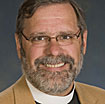Commentary on Jeremiah 1:4-10
In one way, we have here a typical prophetic call story. God calls, the prophet objects, God assures (often through a specific action–here, the touching of Jeremiah’s mouth) and then commissions.
A distinctive element of Jeremiah’s call story, though, is God’s opening claim of omniscient authorial control over Jeremiah’s life. “Before I formed you …I knew…consecrated…and appointed you.” This aspect of the passage has been cited in Christian deliberations about such varied issues as abortion, predestination, and whether or not God has “a plan (including a particular vocation) for my life.”
The hermeneutical question for the preacher is how far and on what terms to encourage identification between contemporary Christians and Jeremiah. Narrowly we might “look back” to the historical encounter and say, “God cared for our ancestors by calling and sending prophets … back then.” But because we preachers (and hearers) yearn for a richer connection with this text–and with the God who calls–we push to make Jeremiah a type for us: Jeremiah’s experience might in some way be our experience.
But how far will it stretch? The “I knew you” part is safe; let us assume that God knows everyone before they are formed in the womb. But does God also consecrate and appoint all of God’s people to specific vocations or only those destined to become prophets? If all, does that mean that God has an “authored plan” for each of our lives? What are the means by which God communicates our consecration and appointment? And what are the consequences should we pursue another line of work?
Jeremiah objects the call on the basis of his age and ability. God responds intuitively about what the real issues are, thereby showing that God really does know Jeremiah! In God’s assurance we can infer that God intuited phobias (at least agora- and xeno-) and writer’s block: “You will go where I send and you shall speak what I command you.” The grace of the passage is that God believes Jeremiah to be a sufficient vessel for this work; nowhere does God set forth a training regimen or a process of board certification for the prophet.
The reader of the passage has an interesting choice when voicing Jeremiah’s objection and then God’s rebuttal. The default option is likely “naïve, fearful humility.” But we know from Jeremiah 1:1-3 that Jeremiah is a pastor’s kid destined (as he well knows?) to go into the family business. It is possible that Jeremiah’s objection was pro forma, an appropriate display of false modesty. God’s voice in response might be anything from kindly encouragement to impatient frustration.
The last verse, read on its surface, is a general affirmation of the power and inclination of God to act in the affairs of nations. A homiletical possibility here would be to consider exactly where and how we see God acting in contemporary political affairs. In the Bible, God acts dramatically and sometimes precipitously. By contrast, was God “building” and “planting” when Queen Elizabeth II invited David Cameron to form a coalition government following the indecisive elections in the United Kingdom earlier this year?
To focus mostly on the last verse in a sermon would be a tricky move for a couple of reasons. First, the dialogue between Jeremiah and God clearly dominates the pericope; a consideration of just verse 10 would require some careful framing. Second, the Old Testament assumes a kind of exclusivity for the “covenantal theocracy” of Judah (and Israel). Certainly some twenty-first century citizens are willing to claim a similar relationship between God and their homeland, but most of us are more modest in our claims. Still, a sermon that takes up Jeremiah’s role as God’s voice in politics would invite consideration of the voice we modern prophets might have.
All that said, when I am sitting in the pew on August 22, I would like to hear some reflection on vocation and how to achieve balance between “call as gracious gift” and “call as a burden impossible to contemplate.” How much should our vocation weigh on us? Does God calls us to be “merely” who God knows us to be, or is there, built into our call, a sense of “be what I know you could be if you really put your mind to it?”
In a culture that calls for (and pretends to) excellence, most of us strive to perfect our skills and to hide our vocational weaknesses. But hear the grace of God embedded in the phrase, “do not say, ‘I am only …'” Can you end that address from God in such a way that I will hear how even with my limitations I might be used by God? By entering into our vocation with a notion of an “easy yoke” and a “light burden” we point to the God whose word, ability, and power sustains us.
Or help me to understand where the prophetic voice is lodged in the politics of our world (in me, the preacher, the Church as a body); what is its scope (congregation, Church, government); and how do I (or we) understand what kind of authority it is in our world to have been consecrated and appointed as a prophet of God. The Old Testament prophets were calling the kings and people of Judah and Israel to renew their allegiance to the God with whom they were in covenant. In the United States, at least, our “rulers” swear allegiance to a secular constitution.
Finally, though it would depart from the core issues, a sermon rooted in verse 5 of Jeremiah’s call story could investigate the idea of “God having a plan” for our lives. Discerning God’s plan (the right vocation, the right partner) is, for some Christians, fraught with excitement and anxiety. Beyond our shared vocation in baptism, what do we believe about God’s choreography and authorship in our lives?

August 22, 2010